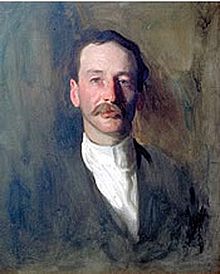Morton Prince
| Morton Prince | |
|---|---|

American Pioneer in Dissociative Disorders
|
|
| Born |
December 21, 1854 Boston, Massachusetts, U.S. |
| Died | August 31, 1929 (aged 74) Boston, Massachusetts, U.S. |
Morton Henry Prince (December 21, 1854 – August 31, 1929) was an American physician who specialized in neurology and abnormal psychology, and was a leading force in establishing psychology as a clinical and academic discipline.
He was part of a handful of men who disseminated European ideas about psychopathology, especially in understanding dissociative phenomenon; and helped found the Journal of Abnormal Psychology in 1906, which he edited until his death.
Morton Prince came from a wealthy Boston family and was involved in the social and intellectual life of that city. He went to private schools and then to Harvard College. He obtained his medical degree from Harvard Medical School in 1879. After Harvard, he took a "Grand Tour" of Europe, a near requirement for upper-class Americans at that time. It was in Paris that he visited Jean Martin Charcot at the Salpêtrière. He was quite impressed with Charcot's theories but returned to Boston to set up an otolaryngology practice. However, the spell of the charismatic Charcot was strong and he quickly switched his practice to neurology, and even adopted Charcot’s showmanship for teaching his classes.
He married Fannie Lithgow Payson, daughter of Arthur Lithgow Payson and Claire Endicott Peabody. They had at least two children, Claire Morton Prince, born about 1885, and Morton Peabody Prince, born August 6, 1888.
During the First World War at Hotel Lotti, Paris, France, Dr Prince was the director of an information bureau and home intended for soldiers and sailors from Massachusetts.
He became a devotee and avid proponent in the use of suggestion in treating mental illnesses in the United States and drew around him all the important practitioners in the burgeoning field of abnormal psychology of that time: Boris Sidis, James Jackson Putnam, William James, G. Stanley Hall, to name but a few. He became the American expert in dissociative disorders, which he also called multiple personality disorder.
...
Wikipedia
